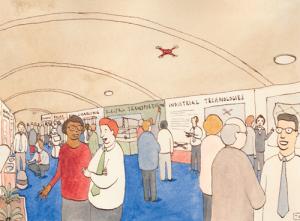Seven Conference Tracks
Steve Mitnick is Editor-in-Chief of Public Utilities Fortnightly and author of the book “Lines Down: How We Pay, Use, Value Grid Electricity Amid the Storm.”
EPRI has organized Electrification 2018's conference tracks into seven areas focused on industrial, commercial, and residential electrification. Below, the co-chair of each conference track explains how each track is structured.
Electric Transportation

Dan Bowermaster, Program Manager, Electric Transportation, EPRI
Electric transportation is moving beyond light-duty cars worldwide, as electric buses, trucks, taxis, and ferries are increasingly deployed. EPRI is building on the experience and leadership of its Plug-In conferences with a track fully dedicated to small- and large-scale electric transportation.
Co-chaired by Britta Gross, Director of Advanced Vehicle Commercialization at General Motors, this track assembles experienced leaders of the EV sector to debate the hottest issues impacting the EV market, as well as the merits, timing, costs, and benefits of possible solutions.
Spanning future on- and off-road vehicles, electric transportation, high-power charging, cost and benefits, smart charging, customer preferences, grid impact, and challenges and lessons learned, this track is intended to engage and benefit EV experts from every part of the industry.
Industrial Technologies - Technologies and Implementation
Allen Dennis, Senior Program Manager, Electrification for Customer Productivity, EPRI
The industrial technologies track covers a range of current and emerging technologies and systems in agriculture, off-road transportation, and large and small commercial and industrial applications.
Discussions in multiple tracks over three days will encompass electric technologies beneficial to these customers, including industrial process heating, commercial food service equipment, water treatment systems, and multi-modal terminals.
Also covered: strategies to help utilities, utility customers, and vendors adopt these technologies. An indoor food production session, as well as breakthrough technology sessions, will provide insight on technologies around the corner.
Residential and Commercial Electric Technologies
Ron Domitrovic, Program Manager, Energy Efficiency and Demand Response, EPRI
This track examines the research, development, and complex issues arising from or linked to electrification impacts on homes and businesses. It covers electric technologies such as space and water heating, including heat pumps; overall efficient electrification approaches to residential and commercial buildings; and lessons learned from U.S. advanced energy community projects. Planned topics also include customer-connected electric devices and ways to better understand residential and commercial customer needs.
Understanding the Costs and Benefits of Electrification
Bill Gould, Director, Energy and Environment, EPRI
Utilities, manufacturers, utility customers, and business owners face the challenge of assessing electrification's relative benefits and costs.
In this conference track, industry and vertical market experts will present the results of national studies on electrification potential; electrification assessments tailored to individual states and utilities; and the impacts of electrification on water use and quality. Attendees will also hear about methodologies for assessing the costs and benefits of electrification, the water-energy nexus, and more.
Grid Modernization for an Electrified Economy
Daniel Brooks, Director, Grid Operations and Planning, EPRI
This conference track examines challenges and potential methods for enhancing the power grid to accommodate a benchmark of electrification, defined as fifty percent of end-use energy consumption provided by electricity.
The track highlights transmission and distribution infrastructure components, beyond poles and wires, that utilities need to address as electrification progresses. Session topics include transmission-level analytics and planning; distribution-level analytics and planning; and beyond-the-meter, customer-side infrastructure to support electrification.
The Policy and Regulatory Landscape for Electrification
Deana Dennis, Senior Manager, Government and External Affairs, EPRI
Policy and regulation are integral to realizing electrification's benefits. This track looks solely at policy and regulatory challenges and opportunities as electrification progresses.
Co-chaired by Sheryl Carter, Co-Director of Energy Programs at the Natural Resources Defense Council, this track assembles thought leaders who influence or make policy and investment decisions at the state, local, federal, and international levels.
Planned topics include identifying and solving challenges of the cost for electrification; the role of flexible, advanced electric loads in optimizing the power grid and associated incentives; how states and localities are preparing for increased adoption of plug-in EVs and lessons learned; and exploring how electrification can enable the outcomes desired through advanced energy communities.
Breakthrough Technologies
Beth Hartman, Technical Leader, Technology Innovation, EPRI
Breakthrough technologies are essential in making the power grid more efficient, distributed, and resilient. Working with innovators around the world, EPRI is dedicating this track to creative solutions including improved electric energy storage, EVs, advanced nuclear generation, new models for wind and solar power generation, indoor agriculture, aerial drones, artificial intelligence, and more.
This track is reaching out to thought leaders in the EPRI Incubatenergy Network, InnoEnergy in Europe, California Clean Energy Fund contacts with the World Bank, the Asia Development Bank, the World Wildlife Foundation, and others.
Leading energy entrepreneurs from around the world will exhibit at the conference expo and offer insights to their solutions through presentations and panel discussions. Additional insights will come from leading stakeholders in energy innovation, including investors, corporations, laboratory researchers, government leaders, and others.


